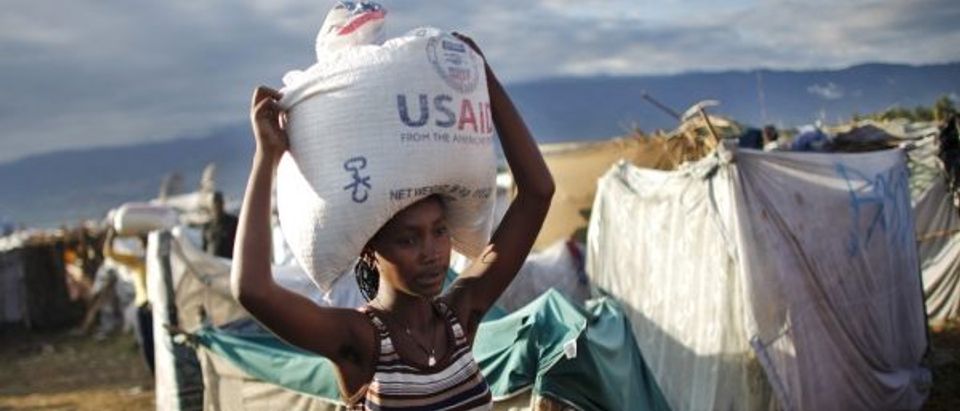Recently, the Washington Post published a report on the chaotic effect of famine in regions of Nigeria, Somalia, and South Sudan. The piece proposed additional foreign aid to help these fix the humanitarian crisis. Unfortunately, more aid will not solve the famine in Africa. Instead, donors should encourage these countries to address corruption, partner with them to improve security, and help them liberalize their economies.
Since 1960, Africa has received over $200 billion in aid, but the poor conditions in most parts of the continent remains unchanged. Foreign aid cannot be successfully implemented in Africa without addressing the underlying problem of corruption that allows governments to squander funds. Recently, Transparency International’s corruption index ranked Somalia and South Sudan the most corrupt countries in Africa while Nigeria was 136 out of the 176 countries. This appalling state of financial trust creates a situation in which a prolonged romance with foreign aid will do little to help those in need without seriously addressing systemic corruption.
For example in 1996, the UN launched a $25 billion special initiative for African poverty reduction. Most of these donations were in the form of monetary transfers rather than direct investment. Within three years, over 70 percent of the funds were either unaccounted for or embezzled. The recipient countries included Nigeria, Somalia, and Republic of Sudan. Later in 2005, because of soaring debt, the World Bank, IMF, and the African Development Fund cancelled about $100 billion of debt in 30 African countries.
Subsequent emergencies like civil war, disease epidemic, and famine saw the return of foreign aid, which again invited corruption. Today, aid-related debt in Africa has almost reached 2005 levels. Another round of foreign aid would likely have the same result. Apart from the lack of financial accountability, social insecurity also impedes aid and increases sufferings during famine crisis. Therefore, it requires the same urgent attention.
Nigeria, South Sudan, and Somalia are breeding grounds for terrorism and ethnic violence. In parts of northern Nigeria, Boko Haram’s insurgency still poses a threat, especially in bordering towns. In South Sudan, aid is often used as one political weapon among many in the midst of the current civil war. To maintain their strongholds, government forces and rebels usually seize and loot aid supplies. Dozens of aid workers have even been killed by rebel militias.
Al-Shabab is also wreaking havoc in southern Somalia. During the devastating famine in 2011 that killed over 260,000 Somalis, al-Shabab rejected the import of western food aid and levied taxes on aid organizations. In 2016, the sect killed 11 aid workers and looted aid depots before burning villages.
Given these ongoing issues, committing more resources to African aid at this time is unlikely to yield positive results. Instead, donors should encouraging economic growth, which could be a more effective way to reduce internal conflict. The economic condition of a country in part determines its risk for internal conflict. For countries in the bottom 10 percent of income their conflict risk level was around 18 percent. However, average income countries had a lower conflict risk level of around 11 percent. The risk continues to decline as GDP per capita increases, which makes economic development an effective way to address conflict.
Donors can also support Nigeria and Somalia in improvements to their counter terrorism strategies. This might include personnel training in intelligence gathering and emergency management. They can also help South Sudan with a lasting diplomatic solution to its conflict. If this happens, they would save their funds, and the economic landscape of these countries will be much stronger. The relative peace in former conflict zones such as Burundi, Rwanda, Congo, Sierra Leone and Liberia have saved the international community aid dollars while internal measures are propelling on a rapid economic growth.
Instead of the usual funds transfer, donors should consider improving their foreign direct investment by first encouraging these countries to adopt pro-market investment policies, and then directly invest in key sectors like energy and transportation. Pro-market policies such as reducing taxes and repealing protectionist policies would also aid economic growth.
These changes would allow for more investment and create jobs. Besides, if employment increases, individual income will improve and indigenous investment will grow. These are strong alternatives that keep economies alive and provide for the needy during emergencies such as famine.
Nonetheless, it is relevant to remember that Africa still bears the bruises of past foreign aid, which increased corruption, debt, and poverty. Foreign aid sounds like the humanitarian solution, but it can’t solve crises in Africa while there are so many internal problems.
Ibrahim Anoba and Tirzah Duren are African Political Economy pundits with Young Voices. Ibrahim is from Lagos, Nigeria and Tirzah lives in Washington, D.C. You can follow both on Twitter @Ibrahim_Anoba and @TzDuren.












